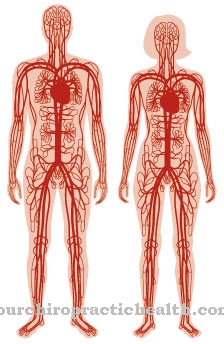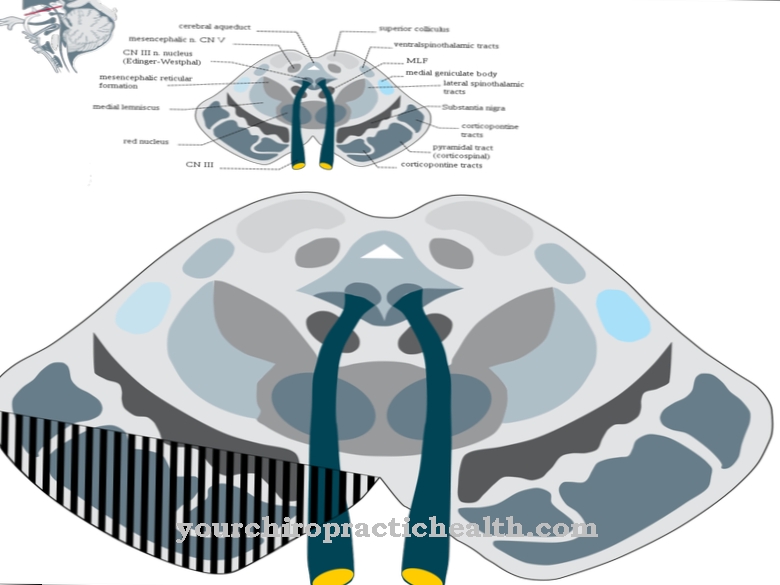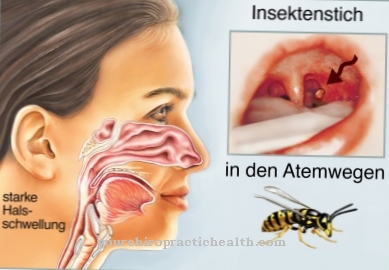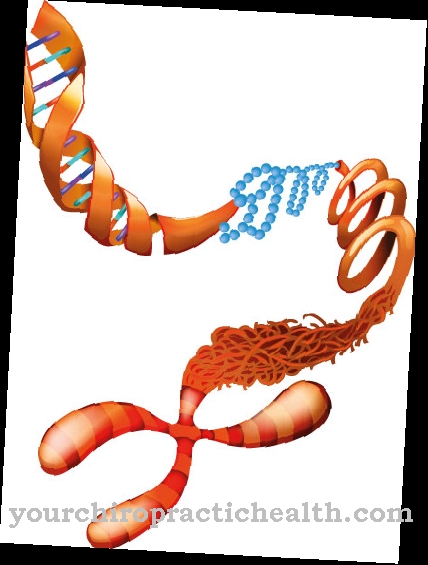Under the Hyposalivation the medical professional understands the lack of secretion of saliva. The oral mucosa becomes reddened by this phenomenon, it hurts and is sometimes inflamed. Therapeutic methods such as the administration of saliva substitutes can be used against dry mouth.
What is hyposalivation?

© sakurra - stock.adobe.com
As Hyposalivation the lack of secretion of saliva is known. The opposite is the above-average secretion of saliva, which is also known as hypersalivation. When the flow of saliva is reduced by half of its normal value, the medicine also speaks of a xerostomia, or dry mouth. This means that xerostomia is a special form of hypersalivation in which the entire oral mucosa is no longer wetted with sufficient amounts of saliva.
In addition to moistening the oral mucous membranes, saliva also has functions in food intake that are no longer satisfactorily fulfilled if there is a lack of saliva secretion. From illnesses to hormonal changes or medication, various causes can trigger hyposalivation or dry mouth. In a healthy organism, the salivary gland releases about one milliliter of saliva per minute. If the mouth is dry, this value is reduced to less than 0.5 milliliters.
causes
The most common cause of hyposalivation or dry mouth are physiological signs of aging. With old age, the secretion of saliva naturally decreases because the salivary glands are less active. In addition, many people of a certain age take medication that can reduce the flow of saliva. These drugs include, for example, antihypertensive drugs, anticholinergics, tricyclic antidepressants, antihistamines and cytostatics.
More than 400 drugs describe hyposalivation in terms of their side effects. Amphetamines can also have a throttling effect on saliva secretion. A lack of fluid intake and dehydration can also dry out the mouth. That being said, psychological factors such as stress can minimize saliva production. Radiation therapies are just as frequently mentioned as the cause.
Possible causal diseases include Zagari's disease, Sjogren's or Heerfordt's syndrome, as well as AIDS and sepsis. In addition, inflammation and tumors of the salivary glands can result in hyposalivation.
Symptoms, ailments & signs
If there is hyposalivation, the saliva loses its buffer function. This means that the oral mucosa is reddened and vulnerable to inflammation. Sometimes the gums bleed. Mouth pain is therefore a frequent accompaniment to hyposalivation. A burning sensation on the tongue is the main characteristic of the disease. The risk of caries attack also increases with reduced saliva secretion.
Harmful acids in the mouth are hardly neutralized by the lack of saliva. Bad breath sets in. After a long time, the entire oral mucosa atrophies. In many cases, chewing is difficult. The same applies to the swallowing movement. In addition, the sense of taste can be affected. The patients often have above-average thirst. Instead of a clear liquid, the oral fluid becomes frothy. Sometimes patients can barely speak if they have extremely dry mouth.
Diagnosis & course of disease
The diagnosis of hyposalivation is usually made by palpation. The doctor uses a glove that sticks to the oral mucosa if there is a lack of saliva secretion in the oral vestibule. If he tries to stroke the salivary glands, the glands do not give off any salivary secretions. In the visual diagnosis, reddened areas and possibly inflammation and caries lesions speak for hyposalivation.
The anamnesis can also provide important information about the lack of secretion. In order to initiate a course of therapy, the doctor must determine the cause of the hyposalivation. The prognosis is also decided by the cause. For example, there is a good prognosis for drugs that only have to be taken for a certain period of time. Dry mouth due to minimal fluid intake is also prognostically favorable. Diseases of the salivary glands are less favorable.
Complications
The hyposalivation mainly causes discomfort in the oral cavity. The mucous membrane is reddened and pain and inflammation occur. In most cases, hyposalivation means that the patient can no longer eat or drink normally, so that the patient usually suffers from underweight or various deficiency symptoms. It is not uncommon for a burning sensation on the tongue and bleeding gums to occur.
The bleeding on the gums is very uncomfortable and leads to pain. Caries and other diseases of the teeth are also common. Patients also complain of a strong and unpleasant bad breath, which can also have a negative impact on the environment. This can lead to social complaints or exclusion.
Those affected also suffer from swallowing difficulties, which can lead to pain, especially when thirsty is increased. The mouth is very dry and the person can hardly speak. In most cases, hyposalivation can be treated relatively easily and quickly. There are no further complications. The treatment takes place causally and depends on the underlying disease. Life expectancy is not restricted by hyposalivation.
When should you go to the doctor?
Symptoms such as repeated bleeding gums and a burning sensation on the tongue suggest hyposalivation. A visit to the doctor is indicated if the symptoms persist over a longer period and no clear cause can be determined. Medical advice is required if other symptoms such as bad breath or difficulty swallowing arise. Caries or a generally unpleasant mouthfeel also indicate problems with saliva formation, which must be clarified by a doctor. People who take medication regularly are particularly prone to developing hyposalivation.
Radiation therapy, stress and illnesses such as AIDS and sepsis are also possible triggers. Anyone who belongs to the risk groups should consult a doctor if the symptoms and complaints mentioned occur. Children who suddenly refuse to eat should be taken to the pediatrician immediately. Bleeding from the gums and pain are also symptoms that indicate hyposalivation in the child and must be clarified immediately. In addition to the general practitioner, the dentist can also be involved.
Doctors & therapists in your area
Treatment & Therapy
The treatment of hyposalivation is based on the cause. If too little fluid has simply been taken in, the deficiency can be easily regulated. If the lack of saliva is due to the patient sleeping with his mouth open at night, the nose must be opened so that nasal breathing can replace mouth breathing.
If the decreased saliva secretion is the symptom of another condition that may not be cured, the patient will be given saliva substitutes. The administration of these agents can relieve the symptoms symptomatically. The consumption of sugar-free chewing gum is often recommended as it stimulates the flow of saliva. Instead of chewing gum, certain drugs can stimulate the glands to secrete saliva.
If necessary, medicinal saliva stimulation via the substance pilocarpine can be used. Hyposalivated patients are also often encouraged to maintain good oral hygiene. Otherwise, the reduced flow of saliva increases the risk of inflammatory reactions and tooth decay. If drugs are responsible for hyposalivation, the benefits and risks of these drugs are discussed.
Since hyposalivation usually bears a lower risk compared to not taking a certain drug, discontinuing the drug is usually not recommended.
prevention
Most causes of hypersalivation or dry mouth cannot be counteracted. Hyposalivation as a result of dehydration can be avoided by consuming at least 1.5 liters of fluid a day. Dry mouth caused by mouth breathing during sleep can be prevented by removing the polyps.
Aftercare
For aftercare after hyposalivation, doctors often recommend sugar-free chewing gum. These increase the flow of saliva, which reduces the risk of inflammation and tooth decay. Depending on how badly the saliva stimulation is impaired, medication can also be used. However, doctors usually advise against any further medication for patients who have the disease as a result of other medications.
As part of the follow-up treatment, good oral hygiene is therefore more of a priority. This, together with the normal flow of saliva, reduces the risk of inflamed areas in the mouth. To counteract the dry mouth, it often helps to drink more. Patients should consume at least 1.5 liters a day to avoid the special type of dehydration.
If the problems do not get better over a longer period of time, an exact root cause research is carried out. Breathing through the mouth while sleeping can be responsible, among other things, for the reduced flow of saliva. Surgically removing the polyps may help. Other measures against unconscious mouth breathing can also improve the situation.
Sometimes it helps not to lie on your back, but on your side. Those affected should have chewing gum close at hand against an acute dry mouth. Sugar-free chewing gum, which does not damage dental health, is best.
You can do that yourself
In the case of hyposalivation, the person concerned has a number of options for self-help so that a doctor does not have to be consulted in every case.
In most cases, hyposalivation occurs due to insufficient fluid intake. If the person is not drinking enough fluids, this habit must be changed. As a rule, the patient should then drink around two liters of fluid a day. Sleeping with your mouth open can also promote hyposalivation and should be avoided. If there is an acute shortage of saliva in the mouth, it can also be stimulated relatively well by chewing chewing gum. Sugar-free chewing gum is particularly suitable in order not to damage the teeth.
Some medications can also promote the disease. They can also be discontinued or replaced by others after consulting a doctor. However, a doctor should always be consulted first. If the complaints cannot be treated by means of self-help, the person affected is usually dependent on a visit to the doctor.



.jpg)























